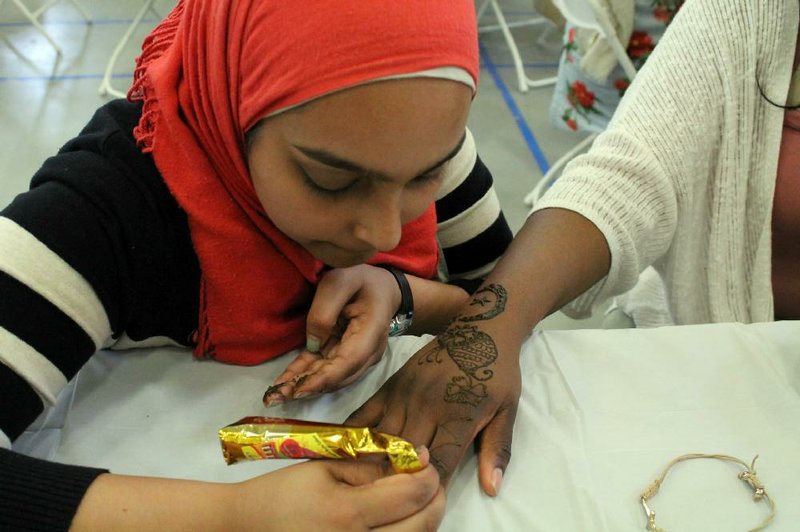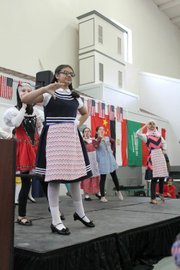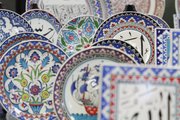International residents in the Little Rock area shared cuisines and cultures in an expression of unity and cultural diversity April 15 at the second annual Little Rock International Food Festival.
The festival, organized and hosted by the Islamic Center of Little Rock, invited attendees to learn about many Middle Eastern countries, including Egypt, Jordan, Syria, Turkey, Lebanon and Saudi Arabia. Pakistan, Bangladesh, China, Mexico, Switzerland and Canada also were represented at the event.
Visitors could sample a taste of Pakistan by trying haleem, a slow-cooked dish of beef, lentils and spices known in the country as a snack and comfort food. Biryani, another traditional Pakistani dish, is made by preparing rice in water with cloves, cumin and salt, and layering it with chicken masala.
Aspects of daily life -- clothing, jewelry and handcrafted items -- and photos of notable figures and scenes from many countries were as plentiful as the entrees and desserts.
"Do you know about Malala?" asked Humaira Pathan, pointing at a framed portrait of Malala Yousafzai, the 19-year-old Pakistani advocate for female education and the youngest-ever Nobel Prize laureate. Other major figures in Pakistan included that of Benazir Bhutto, "the first woman to head a Muslim majority nation," according to Pathan; and Muhammad Ali Jinnah, Pakistan's founder.
At the table designated for all things Egypt, guests could learn about its cities, pyramids and more. Those wishing for something more interactive could have their name spelled out in hieroglyphics on makeshift papyrus.
Sfeeha, a meat pie, and fatayer, a flat cheese pie, both of which are commonly eaten in Lebanon, were offered at a combined display also representing Syria and Jordan.
"Our cultures are really close," said Zain Al Shobaki, who helped set up the spread, "so we didn't put every [country] at a different table."
During her life in Jordan, she said, her family had neighbors who were Jewish, Christian and Muslim. Parents would care for one another's children, who played together regularly. At Christmas, each family would help others decorate for the occasion. In her neighborhood, said Al Shobaki, people didn't argue about religion, choosing to instead participate in celebrating one another's holiday festivities.
Falafel, hummus, pita and chicken shawarma were among other Middle Eastern foods to be found at the festival. Desserts included baklava, a delicate, flaky pastry soaked in syrup; lady fingers, a Middle Eastern dessert served at Ramadan; and kunafa, a Palestinian cheesecake made with Nabusi cheese. Just outside the entrance doors to the festival, people stood in long queues before carts offering Italian-style ices, funnel cakes and cotton candy.
All proceeds from the festival's sales of food, handcrafted items, accessories and activities benefited Huda Academy, the elementary school on the Islamic Center's campus.
The academy's students also gave presentations featuring songs and dances from other international regions during its talent show. Students performed choreographed dances to songs such as "Frere Jacques," a French lullaby; and a Norwegian song for children called "Danse i en ring" ("Dance in a Ring"). Among the closing acts was a presentation of dabke, an Arab folk dance performed in Iraq, Syria, Lebanon and parts of Saudi Arabia.
Rula Sajdieh, a teacher at the academy, watched during the talent show as fourth-grader Fatima Yousuf read a passage from the Koran, the holy text of Islam. Yousuf's ability to read fluently in Arabic, said Sajdieh, is attributed to more than a year of study. Students begin learning Arabic by reading from the Koran, practicing Arabic phonics and pronunciation four times a week until they can read Arabic without an accent. "They do even better than their parents" by the time they have mastered the language, Sajdieh said.
Her husband, Ziad Abdulla, a former school principal in Dallas, accepted a position as the academy's principal two years ago. The couple have lived in the United States for 17 years.
Abdulla believes in teaching students about other cultures, he said, so they can grow up learning to live peacefully alongside their neighbors, wherever that might be. At the same time, he said, he hopes students will retain the sense of the culture in which they were raised. In general, he hopes for unity and peace with residents in the area and the country.
"We want to be open to other people from different backgrounds, because this is America," Abdulla said. "America is a lot of different cultures."
Don Martin of Stuttgart and his girlfriend, Deneen Hill of Little Rock, were drawn to one of the day's most-sought attractions: a booth where a person could be photographed in an Arab sitting room, complete with a three-sided majlis, or Arab sitting furniture. The temporary room also was furnished with rugs, wall tapestries and a version of an Arab coffee table, round and set with gleaming gold teaware.
Martin, a social worker at John L. McClellan Memorial Veterans Hospital in Little Rock, said he and Hill's own backgrounds were part of the reason they attended the festival.
"We're a diverse couple," Martin said. "I'm Filipino, and [Hill] is African-American. [Here] we get to know what's going on in other cultures and make that connection culturally.''
At the hospital where he works and as the head of guest services at the church he attends, Martin serves a wide-ranging population.
"I'm here because all people are diverse and I think that we need to accept people for who they are," he said.
Hill gave her own reasons for seeking out the event.
"I attend a church called Mosaic Church in central Arkansas," she said. "We have over 32 different countries represented in our church. Our pastor is Chinese, we have a Latino part of our church, and we have people from all over the world at our church.
"We're taught to embrace all cultures. ... I wanted to come here because this is a picture of what God's kingdom is going to look like."
Some attending the festival said they simply wanted to experience something different. One person was invited by her employer, who wanted her to meet his family at the festival.
About 4,000 people turned out for the festival -- more than double the number the center had anticipated. The crowds were a welcome sight for the center's participants and volunteers, who had worked to set up displays the day before the festival.
"The Muslim community here is a growing community," said Rania Elbahey, a graduate student studying applied communications at the University of Arkansas at Little Rock.
When she and her husband, a doctor at the University of Arkansas for Medical Sciences, first came to the United States eight years ago, the Muslim community was smaller, Elbahey said.
She said she saw the festival as a way to make friends and celebrate growth and outreach, especially with regard to interfaith dialogue in the community. Elbahey expressed her joy and sense of peace with her life in Little Rock.
"I'm very, very happy in Little Rock, because [it's] the kind of life I imagined for myself and my family," she said.
Abdul Abunasrah, who has volunteered at the Islamic Center for about 10 years, also spoke of the festival's well-achieved goal.
"We wanted to have a more [outreaching] program and open our doors to the greater community of Little Rock to come and learn about us ... on a personal level, where we can meet, make friends, and they can also come and enjoy souvenirs and also taste our food," Abunasrah said. "It always seems like food breaks the ice better."
Religion on 04/22/2017



